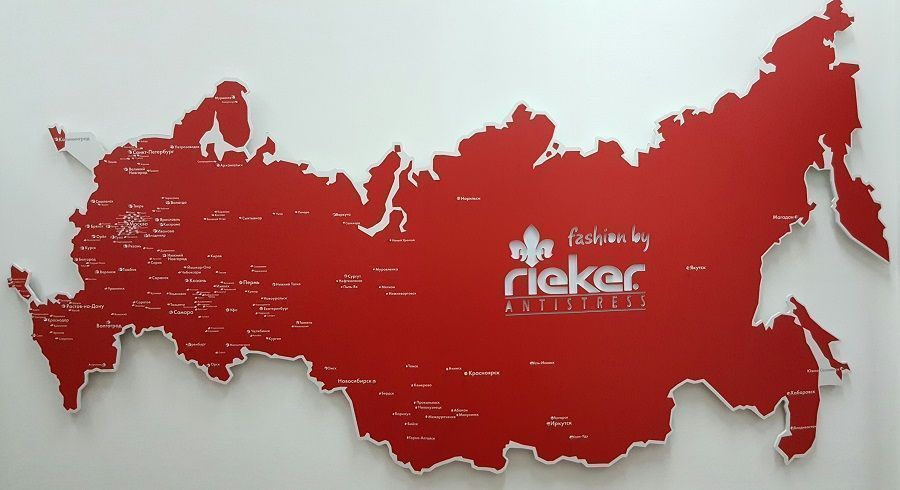
Shahin Asadov “Riker Vostok”: Formation of a collection - a mathematical problem

General Director of Riker Vostok Shahin Asadov talks about how shoe collections for the Russian market are being developed, and also shares the company's plans.
 Shahin Asadov - CEO of Riker Vostok
Shahin Asadov - CEO of Riker Vostok“Someone believes that he makes fashion, and we produce what people need,” said Shakhin Asadov, the head of Riker Vostok. In an interview with Shoes Report, he spoke about Rieker’s approach to building shoe collections for its Rieker and Remonte brands, which are based on rigorous mathematical calculations and professional intuition.
How difficult was 2016 for your company?
The fact that orders for the spring-summer 2017 season began to grow after two years of stagnation is a confirmation that some recovery in the market has come. I assume that for the fall-winter season 2017 / 18, an increase in orders of approximately 15% can be expected. Of course, it is worth considering that Moscow and St. Petersburg are the first to react to the onset of the crisis, then cities with a population of over one million, and then the province. When Moscow and Peter complain, millionaires still trade well, when millionaires complain, everything is fine in the provinces. And now the reverse development is already underway - Moscow, St. Petersburg and millionaires have begun to recover, and small towns have just felt the crisis. Therefore, in general, we expect an increase in some territorial redistribution of orders - an increase for large customers and a decrease or preservation of last year's volume for small ones.
Have you reduced your wholesale prices due to the crisis?
Initially, for wholesale sales, we reduced prices in rubles by 10%, and the recommended retail prices remained at the same level, since during these two years of crisis, the trading margin was reduced for everyone. We did this so that people can move away from the crisis and start earning a little more. It can be seen that somewhere rental is growing, and retail expenses should be covered.
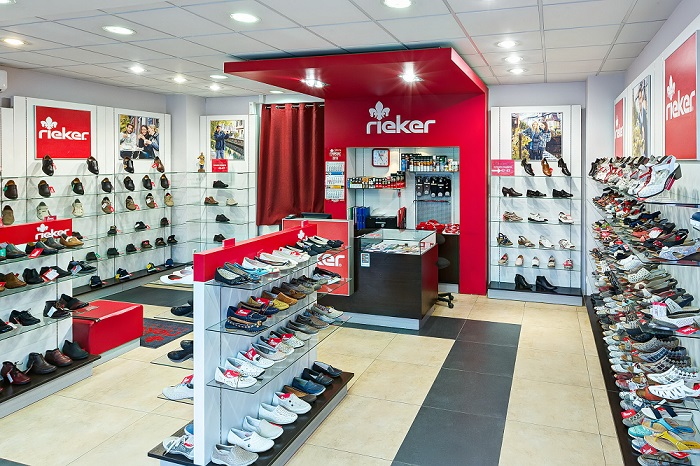
As a result of the crisis, many retail operators could leave the market. Do you have a feeling that their number has decreased?
No. During these two crisis years, we had clients who missed the season, but now they are returning. Judging by our partners, the share of those who closed the business is no more than 1%, and we have more than 1,5 thousand clients. Although the fact that places in shopping centers are being vacated and some shops are closing can be seen with the naked eye.
In February of this year, we were in Khabarovsk, Irkutsk and noticed that in some places where it was previously difficult to rent something, now they offer either rent or sale, the whole city is covered with advertisements, which means that someone is leaving. But our customers are expanding. In the same Khabarovsk last year, two new Rieker stores opened. If everything goes well, the store of our second Remonte brand will soon open there. In Sterlitamak, customers opened Rieker, and Remonte will open by April.
That is, in general, the mood is positive?
Generally positive, today in Russia there are already 427 stores with a Rieker sign, and if everything goes according to plan, then by the end of this year there will be more 450. However, it is very important for us not to allow large differences in either plus or minus. Well, if you can plan everything in such a way that there are no surprises.
That there were no course jumps?
As well as jumps in orders. We have our own factories, production must be loaded. But a sharp increase in the volume of orders is also not easy; you will have to quickly recruit employees.
What do you think about the labeling of shoes that they plan to introduce this year?
To be honest, I don't take the idea of labeling seriously, because I don't see any sense in this for our segment. There are excise stamps in Belarus, so what? It is inconvenient, unprofitable and nobody needs it, except that the state earns a conditional 50 kopecks on it. This creates great difficulties for private entrepreneurs who import and sell shoes. I do not see what else this can lead to, except for additional costs, and everything will fall on the shoulders of consumers.
But, perhaps, with the introduction of shoe marking, we will be able to get adequate statistics on the shoe market ... Perhaps this will lead to a whitewashing of the market?
There is an opinion that this will help limit gray imports, but it seems to me that this is just a method of unfair competition. If the state is talking about this part of the shoe community, then it confesses its powerlessness to corruption ...
Your company buys leather raw materials, including in Russia. Are you satisfied with the quality of the material?
For several years, we bought leather in Ostashkov, a couple of years we purchase leather material in Nizhny Novgorod, and now we are negotiating with several leather manufacturers. Quality is generally satisfactory. In any case, we have no complaints that there is a big difference in the quality level of Russian-made leather and leather from other countries. From season to season we update about 70% of our collection. This season we also have five new blocks for Eastern Europe, there are eight more blocks that have been developed for the rest of the world.
Is pad replacement taking into account regional peculiarities of the leg?
Yes, and taking into account all the trends that are on the market. We record all changes based on sales statistics. If you look closely at our collection,
You can see elements of almost all the best sellers that are present on the market in this period.
Often people who have not tried to trade Rieker do not understand what is the advantage of our shoes. Many retailers believe that they order shoes for their retail more beautiful, more technologically advanced, from the best materials. But for some reason they do not receive such sales. And the main problem is that the manufacturer and the consumer often approach the assessment of shoes in different ways. Unlike the seller, who, as a rule, sells well what he himself likes, the manufacturer should not like his product. If a manufacturer falls in love with his product - that’s all, he loses his scent. Also, when you love a person, you do not notice his shortcomings, or they seem to you somehow special. But when the veil subsides, you see that everything was wrong.
Do you have a design team in Germany?
We are a “strange” company, we have no designers: we have collectors and fashion designers. We try to optimally apply what is trendy. The main thing, as often happens in life, is to understand in what proportion it is necessary to use what is already being applied. Of course, we try to do something technologically better than others, more optimally in terms of price and materials. We see this as a mathematical problem.
That is, you study the demand - what they wear, what they buy ... Some part of the people, being conservatives, buy certain models all the time?
Not really, because we change our collection every year by almost 70%. We have accumulated over many years (Rieker was founded in 1874 year) enough indicators to assess possible changes in consumer habits for each subsequent year compared to the previous one. Of course, it happens, and we are mistaken when the market changes dramatically - for example, all of a sudden everyone begins to wear sneakers, or all sharply switch to high sandals. But there are practically no serious miscalculations. Because we do not change individual parts of the collection dramatically. We are changing to the extent that the market can perceive this change.
But is it someone who determines?
We have product managers, here they are engaged in this analysis, they tell technicians - what and how to do, set the task to techno-logs and fashion designers. Of the more than 1000 models prepared for selection, ultimately about 400 remain in the collection.
The point is to first make a large collection, and then discard something that does not work?
No, there is no such task. Just every week we get new statistics. When they started making the collection, there were some priorities, two months later, others, and sales were constantly going on.
Therefore, we are the last to create our collection, everyone releases their collections and starts selling a month and a half earlier than us. Someone thinks that they are making fashion, but we are producing what people need. Therefore, other brands that produce ultra-fashionable shoes are like a lover, and Rieker is like a good wife. Sometimes you can run to the side, but you have to live with your wife, because it is long-term and reliable. You can run a life-long marathon with us, and you can also run short distances with others. But the worst thing is like in that joke - when you have sclerosis and an upset stomach - run and do not know where and why. Although this is a joke, many people really don't know where they are running, but do you know why? They haven't studied the demand.
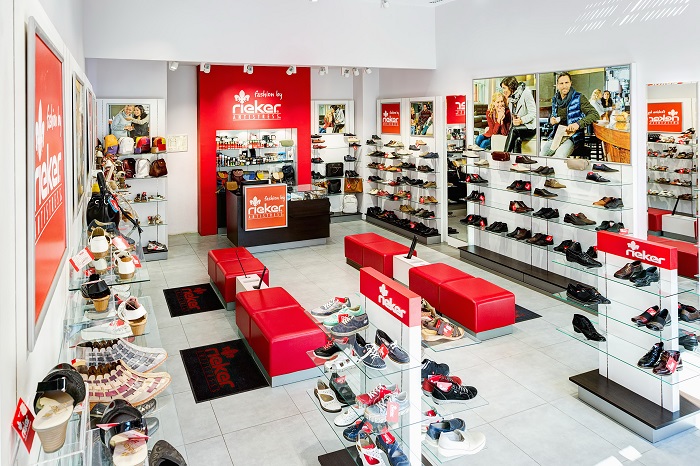
Most “professionals” think they know what and how to produce. When their product is not for sale, they accuse the consumer of not having matured or understanding what they are offering. Every season, we start from scratch, studying the market in terms of consumption using our own methods. We believe that the consumer is always right in their choice!
Do you give your buyers any recommendations on what will work?
Firstly, all the models that we offer are designed with the expectation that they will be sold. But if you are a small client and you need 10-15 products, we can help you choose what sold well last season. You need to start with proven models.
Are there any serious failures in the collection or are the shoes about the same for sale?
We do not send for production items that have less than 2000 pairs of orders. If there is less, it is already a failure. But we can be proud of the fact that our East European models fall the least in terms of percentage. While in the Western European collection up to 40% of articles are not produced, we had only 5% of such articles last season.
Collections for different regions are very different?
It depends on how similar the sales are, only the numbers determine which trends fall into the collection and which do not. We had a lot of developments that did not go to Russia, but went to Europe or vice versa.
And did you have running models, now is it relevant?
A bit, and not quite sneakers. Indeed, in Europe there is now a boom in sneakers, and they accounted for up to 25% of shoe sales in Europe last year. But we have our own climatic features, and the collections for Western Europe and Eastern Europe fall-winter season are very different, spring-summer - less.
Buyers select a collection based on their idea of what will be sold, and do not always guess. You try to focus on the taste of the end user, but present the collection primarily to buyers. How is this problem solved?
With a good retail owner, the mistake in choosing a collection is made no more than two seasons, then everything becomes clear. The retail owner, if he is studying the numbers, will tell his purchaser not to come from his own taste, but from what is for sale, or he will change the buyer.
If retail owners do not do this, their business will be minimized. In general, it is believed that only three percent of people have the gene for a successful trader. Among the best managers in the world there is not a single excellent student, because the businessman initially tries to approach everything optimally. So even at school, he already understands that part of the subjects studied in his life will not be useful to him, and he needs good grades only in certain disciplines, which he is trying to push. Natural-born entrepreneurs at this age begin to optimally approach all issues. And a person who tries to do everything as prescribed is just a good performer. For business, you need a flair and the ability to make decisions. The Germans say that the decision is made in the region of the solar plexus - this is not the head and not the heart, not love and not calculation, it is something else.
Interviewed by Marina Shumilina
This article appeared in issue 146 of the print edition of Shoes Report
| Please rate the article |
Materials on the topic
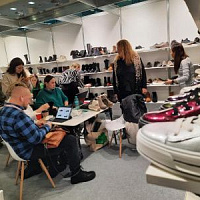
The international footwear exhibition Euro Shoes premiere collection was successfully held in Moscow

We are ready for active development in the Russian market
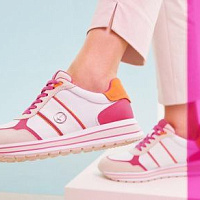
Bright colors of the approaching spring: shoe brand TAMARIS showed a new collection SS'24
IGI&Co presented at EURO SHOES a new line of Urban active sneakers with a GORE-TEX membrane

Turkish brand Vaneda on Euro Shoes
Popular
 Coach turned to Big Data analysis and won the interest of a young audience
American handbag brand Coach has planned the success of its Tabby model among a younger audience, Generation Z, by turning to big data analysis, abandoning traditional and analogue tools, such as human intuition or the ability of any executive to sense “which way the wind will blow,” writes B.O.F.
Coach turned to Big Data analysis and won the interest of a young audience
American handbag brand Coach has planned the success of its Tabby model among a younger audience, Generation Z, by turning to big data analysis, abandoning traditional and analogue tools, such as human intuition or the ability of any executive to sense “which way the wind will blow,” writes B.O.F.
 IDOL updates the concept
The IDOL brand, part of the Melon Fashion Group portfolio, opened the first flagship in an updated concept in the Aviapark shopping center in Moscow.
IDOL updates the concept
The IDOL brand, part of the Melon Fashion Group portfolio, opened the first flagship in an updated concept in the Aviapark shopping center in Moscow.
 Louis Vuitton opens a new factory in Italy
Louis Vuitton has opened its second shoe factory in Italy. After opening the first one in Fiesso d'Artico in Veneto, the LVMH flagship brand has just opened a new production site dedicated to this category of footwear in the industrial zone of Civitano in the Marche region. There is also another brand production facility in Tuscany, where bags and leather accessories are produced, writes fr.fashionnetwork.com.
Louis Vuitton opens a new factory in Italy
Louis Vuitton has opened its second shoe factory in Italy. After opening the first one in Fiesso d'Artico in Veneto, the LVMH flagship brand has just opened a new production site dedicated to this category of footwear in the industrial zone of Civitano in the Marche region. There is also another brand production facility in Tuscany, where bags and leather accessories are produced, writes fr.fashionnetwork.com.
 The Euro Shoes@CAF exhibition will be held in Almaty
From March 11 to 13, the Euro Shoes@CAF (Central Asia Fashion) exhibition will be held in Almaty at the Atakent exhibition complex. The exhibition, which is the largest international event in the fashion industry in Central Asia, will present collections of clothing, shoes and accessories.
The Euro Shoes@CAF exhibition will be held in Almaty
From March 11 to 13, the Euro Shoes@CAF (Central Asia Fashion) exhibition will be held in Almaty at the Atakent exhibition complex. The exhibition, which is the largest international event in the fashion industry in Central Asia, will present collections of clothing, shoes and accessories.
 Euro Shoes will start operating on February 19 in Moscow!
The winter session of the international exhibition of footwear and accessories Euro Shoes premiere collection will be held in Moscow at the Expocenter from February 19 to 22. The organizers promise the presence of all the main participants at the exhibition, as well as new names from Europe, Asia and Russia.
Euro Shoes will start operating on February 19 in Moscow!
The winter session of the international exhibition of footwear and accessories Euro Shoes premiere collection will be held in Moscow at the Expocenter from February 19 to 22. The organizers promise the presence of all the main participants at the exhibition, as well as new names from Europe, Asia and Russia.
 American buyers couldn't buy Birkin bags and sued Hermès
French fashion house Hermès is facing a lawsuit in California from two customers who were unable to purchase exclusive Birkin bags. The fashion house is accused of unfair commercial practices.
American buyers couldn't buy Birkin bags and sued Hermès
French fashion house Hermès is facing a lawsuit in California from two customers who were unable to purchase exclusive Birkin bags. The fashion house is accused of unfair commercial practices.
 Why Rendez-Vous and Yandex Lavka released a “bread bag”
Shoe retailer Rendez-Vous announced the launch of a spring collaboration with Yandex Lavka and released a roll that resembles the shape of a woman’s handbag. This “Bread Bag” is presented in the Yandex.Lavka application at a price of 249 rubles. On the product packaging there is a promotional code for 1000 rubles, which can be spent in the Rendez-Vous network.
Why Rendez-Vous and Yandex Lavka released a “bread bag”
Shoe retailer Rendez-Vous announced the launch of a spring collaboration with Yandex Lavka and released a roll that resembles the shape of a woman’s handbag. This “Bread Bag” is presented in the Yandex.Lavka application at a price of 249 rubles. On the product packaging there is a promotional code for 1000 rubles, which can be spent in the Rendez-Vous network.
 Camper has released innovative sneakers - designers
Spanish brand Camper's new Roku sneaker features six interchangeable components to create up to 64 different looks and color combinations. Roku means "six" in Japanese.
Camper has released innovative sneakers - designers
Spanish brand Camper's new Roku sneaker features six interchangeable components to create up to 64 different looks and color combinations. Roku means "six" in Japanese.
 Christian Louboutin presented a collection in a cowboy style
At the Loubi Show in Paris, the French luxury brand Christian Louboutin presented its fall 2024 collection, following the trend - in the style of the Wild West. It included cowboy boots and rhinestone loafers.
Christian Louboutin presented a collection in a cowboy style
At the Loubi Show in Paris, the French luxury brand Christian Louboutin presented its fall 2024 collection, following the trend - in the style of the Wild West. It included cowboy boots and rhinestone loafers.
 Fashion Week takes place in Moscow
Fashion Week takes place in the Russian capital. Events include fashion shows, markets where you can purchase clothes, bags and accessories, and a B2B Showroom for fashion industry professionals.
Fashion Week takes place in Moscow
Fashion Week takes place in the Russian capital. Events include fashion shows, markets where you can purchase clothes, bags and accessories, and a B2B Showroom for fashion industry professionals.
 Turkish brand Vaneda on Euro Shoes
Street style, sport, outdoor, military – the main style directions of footwear of the company from Turkey
Turkish brand Vaneda on Euro Shoes
Street style, sport, outdoor, military – the main style directions of footwear of the company from Turkey
 Kari accuses Zenden of unfair competition and is suing the FAS
The largest Russian shoe chain, Kari, appealed to the Moscow Arbitration Court to declare the actions of the Federal Antimonopoly Service (FAS) illegal, writes RBC.
Kari accuses Zenden of unfair competition and is suing the FAS
The largest Russian shoe chain, Kari, appealed to the Moscow Arbitration Court to declare the actions of the Federal Antimonopoly Service (FAS) illegal, writes RBC.
 Fashion trends Fall-Winter 2023/24 for commercial footwear purchases
Permanent contributor to Shoes Report. Elena Vinogradova, an expert in sales and purchases in the fashion business, prepared an overview of the trends for the autumn-winter 2023/24 season especially for us.
Fashion trends Fall-Winter 2023/24 for commercial footwear purchases
Permanent contributor to Shoes Report. Elena Vinogradova, an expert in sales and purchases in the fashion business, prepared an overview of the trends for the autumn-winter 2023/24 season especially for us.
 MSCHF and Crocs launch "Big Yellow Boots"
Creator of the Big Red Boots, Brooklyn brand MSCHF has teamed up with American plastic clog and sandal brand Crocs for another oversized shoe. The new Big Yellow Boots will go on sale on August 9th.
MSCHF and Crocs launch "Big Yellow Boots"
Creator of the Big Red Boots, Brooklyn brand MSCHF has teamed up with American plastic clog and sandal brand Crocs for another oversized shoe. The new Big Yellow Boots will go on sale on August 9th.
 Five rules of professional lighting for a shoe store - something that is relevant in any season
When developing a lighting concept for shoe retailers, it is important to take into account not only the history of the brand, the architectural content of the premises, the target audience of the stores, but also the seasonality of the goods. With the onset of the cold season, client preferences change: bright weightless shoes are replaced by more massive models in discreet dark colors. Despite significant differences in summer and winter collections, the overall philosophy of the brand, its recognition should remain unchanged at any time of the year. Tatyana Ryzhova, an SR lighting expert in fashion retail, has identified five basic rules for a competent lighting concept for a shoe store for readers of the magazine, which will help to present winter assortment to customers in a winning way.
Five rules of professional lighting for a shoe store - something that is relevant in any season
When developing a lighting concept for shoe retailers, it is important to take into account not only the history of the brand, the architectural content of the premises, the target audience of the stores, but also the seasonality of the goods. With the onset of the cold season, client preferences change: bright weightless shoes are replaced by more massive models in discreet dark colors. Despite significant differences in summer and winter collections, the overall philosophy of the brand, its recognition should remain unchanged at any time of the year. Tatyana Ryzhova, an SR lighting expert in fashion retail, has identified five basic rules for a competent lighting concept for a shoe store for readers of the magazine, which will help to present winter assortment to customers in a winning way.
 Bertsy: what to look for when choosing a model
Bertsy and tactical boots are becoming more and more relevant footwear, and not only because of the start of the hunting season. In Russia, there are several dozen enterprises producing this type of footwear. Oleg Tereshin, Deputy Chief Technologist of ZENDEN, told Shoes Report about the differences and features of ankle boots and what you should pay attention to when buying them in specialized retail and online.
Bertsy: what to look for when choosing a model
Bertsy and tactical boots are becoming more and more relevant footwear, and not only because of the start of the hunting season. In Russia, there are several dozen enterprises producing this type of footwear. Oleg Tereshin, Deputy Chief Technologist of ZENDEN, told Shoes Report about the differences and features of ankle boots and what you should pay attention to when buying them in specialized retail and online.
 I doubt and object: how to find an approach to difficult clients?
How good and serene would be the work of a salesperson if the customers were calm, cheerful, always knew exactly what they wanted, and bought, bought, bought! It is a pity that this is possible only in dreams. Therefore, we will not dream, but we will act. Together with Maria Gerasimenko, a permanent author of SR, we understand the doubts and objections of buyers and build a strategy for working with them. Our expert pays special attention to the two main objections of buyers, on which 82% of sales are lost.
I doubt and object: how to find an approach to difficult clients?
How good and serene would be the work of a salesperson if the customers were calm, cheerful, always knew exactly what they wanted, and bought, bought, bought! It is a pity that this is possible only in dreams. Therefore, we will not dream, but we will act. Together with Maria Gerasimenko, a permanent author of SR, we understand the doubts and objections of buyers and build a strategy for working with them. Our expert pays special attention to the two main objections of buyers, on which 82% of sales are lost.
 EURO SHOES presents an updated section of the GLOBAL SHOES exhibition with collections of shoe and bag brands from Asian countries
EURO SHOES premiere collection is expanding. Along with the traditional pool of leading European footwear brands from Germany, Spain, Italy and Turkey, several dozen footwear and bag brands from the Middle Kingdom will be presented in the GLOBAL SHOES section at the Moscow Expocentre from August 29 to September 1.
EURO SHOES presents an updated section of the GLOBAL SHOES exhibition with collections of shoe and bag brands from Asian countries
EURO SHOES premiere collection is expanding. Along with the traditional pool of leading European footwear brands from Germany, Spain, Italy and Turkey, several dozen footwear and bag brands from the Middle Kingdom will be presented in the GLOBAL SHOES section at the Moscow Expocentre from August 29 to September 1.
 Two prominent Russian fashion designers Vyacheslav Zaitsev and Valentin Yudashkin passed away
One after another, two days apart, Vyacheslav Zaitsev and Valentin Yudashkin, outstanding fashion designers, whose work for the whole world was a kind of hallmark of fashionable Russia, left this world.
Two prominent Russian fashion designers Vyacheslav Zaitsev and Valentin Yudashkin passed away
One after another, two days apart, Vyacheslav Zaitsev and Valentin Yudashkin, outstanding fashion designers, whose work for the whole world was a kind of hallmark of fashionable Russia, left this world.
 World Footwear Yearbook: Global footwear production reaches 23,9 billion pairs and is back to pre-pandemic levels
The Portuguese association of shoe manufacturers APICCAPS published the 13th edition of the international statistical bulletin World Footwear Yearbook for 2023, according to which in 2022 the production and export of shoes worldwide increased by 7,6% and 9%, respectively, and the world production of shoes reached 23,9 billion couples and returned to pre-pandemic levels.
World Footwear Yearbook: Global footwear production reaches 23,9 billion pairs and is back to pre-pandemic levels
The Portuguese association of shoe manufacturers APICCAPS published the 13th edition of the international statistical bulletin World Footwear Yearbook for 2023, according to which in 2022 the production and export of shoes worldwide increased by 7,6% and 9%, respectively, and the world production of shoes reached 23,9 billion couples and returned to pre-pandemic levels.
 Rostov footwear brand Novak presented a collection of sneakers and sneakers
In the spring-summer 2023 season, the Rostov-on-Don shoe brand Novak presented a cute collection of sneakers and sneakers for every day. The upper of the shoe is made of genuine leather, suede, nubuck, the sole is made of light EVA.
Rostov footwear brand Novak presented a collection of sneakers and sneakers
In the spring-summer 2023 season, the Rostov-on-Don shoe brand Novak presented a cute collection of sneakers and sneakers for every day. The upper of the shoe is made of genuine leather, suede, nubuck, the sole is made of light EVA.
 How to create selling visual content for online based on the identified unique selling proposition?
What is a USP (unique selling proposition) and what is it for? Why is the USP creation service in great demand among fashion retailers today? How to create a working USP? Answers questions and provides step-by-step guidance on how to define your unique selling proposition and work with it to increase online sales, Tatyana Vasilyeva, an SR expert in the promotion and development of fashion brands.
How to create selling visual content for online based on the identified unique selling proposition?
What is a USP (unique selling proposition) and what is it for? Why is the USP creation service in great demand among fashion retailers today? How to create a working USP? Answers questions and provides step-by-step guidance on how to define your unique selling proposition and work with it to increase online sales, Tatyana Vasilyeva, an SR expert in the promotion and development of fashion brands.
 Shoe educational program: what shoe soles are made of
“What is the difference between TEP and EVA? What does tunit promise me? Is PVC glue? What is the sole of these shoes made of? ”- the modern buyer wants to know everything. In order not to smash his face in front of him and be able to explain whether such a sole suits him in soles, carefully read this article. In it, process engineer Igor Okorokov tells what materials the soles of shoes are made of and what makes each of them so good.
Shoe educational program: what shoe soles are made of
“What is the difference between TEP and EVA? What does tunit promise me? Is PVC glue? What is the sole of these shoes made of? ”- the modern buyer wants to know everything. In order not to smash his face in front of him and be able to explain whether such a sole suits him in soles, carefully read this article. In it, process engineer Igor Okorokov tells what materials the soles of shoes are made of and what makes each of them so good.
 How to set prices that will earn
Some businessmen still confuse the concept of margin with the concept of trade margins and set prices for their goods, guided solely by the example of competitors. No wonder they go broke! Analyst at the Academy of Retail Technologies Maxim Gorshkov gives several tips and formulas with which you can set not only ruinous, but also profitable prices.
How to set prices that will earn
Some businessmen still confuse the concept of margin with the concept of trade margins and set prices for their goods, guided solely by the example of competitors. No wonder they go broke! Analyst at the Academy of Retail Technologies Maxim Gorshkov gives several tips and formulas with which you can set not only ruinous, but also profitable prices.
 Sales of shoes and accessories: effective techniques for business rhetoric
Which speech modules are effective in communicating with potential and current customers of shoe stores, and which are not, Anna Bocharova, a business consultant, knows.
Sales of shoes and accessories: effective techniques for business rhetoric
Which speech modules are effective in communicating with potential and current customers of shoe stores, and which are not, Anna Bocharova, a business consultant, knows.
 We form the salary of sellers: expert advice
“How do you charge your consultants for personal or general sales?” Is one of the most popular questions causing a lot of controversy and gossip on the online forums of retail business owners. Indeed, how to properly form the earnings of sellers? But what about bonuses, where to get a sales plan from, do employees allow them to buy goods at discounted stores? In search of truth, the Shoes Report turned to a dozen shoe retailers, but no company wanted to disclose its motivation system - the process of its development was too complicated and individual. Then we asked four business consultants, and finally became convinced that the topic of seller motivation is very complex, because even our experts could not come to a common opinion.
We form the salary of sellers: expert advice
“How do you charge your consultants for personal or general sales?” Is one of the most popular questions causing a lot of controversy and gossip on the online forums of retail business owners. Indeed, how to properly form the earnings of sellers? But what about bonuses, where to get a sales plan from, do employees allow them to buy goods at discounted stores? In search of truth, the Shoes Report turned to a dozen shoe retailers, but no company wanted to disclose its motivation system - the process of its development was too complicated and individual. Then we asked four business consultants, and finally became convinced that the topic of seller motivation is very complex, because even our experts could not come to a common opinion.
 The whole truth about Bayer. Who is he and how to become one?
Bayer is no longer a new, but still a popular and sought-after profession. It’s fashionable to be a buyer. Buyers are at the origins of the emergence and development of trends. If the designer offers his vision of fashion in the season, then the buyer selects the most interesting commercial ideas. It is on buyers that the policy of sales of stores and what, in the end, the buyer will wear depends on. This profession is surrounded by a magical fleur, often associated with a lack of understanding of what exactly is the work of a buyer.
The whole truth about Bayer. Who is he and how to become one?
Bayer is no longer a new, but still a popular and sought-after profession. It’s fashionable to be a buyer. Buyers are at the origins of the emergence and development of trends. If the designer offers his vision of fashion in the season, then the buyer selects the most interesting commercial ideas. It is on buyers that the policy of sales of stores and what, in the end, the buyer will wear depends on. This profession is surrounded by a magical fleur, often associated with a lack of understanding of what exactly is the work of a buyer.
 Technology Selling Issues
There is nothing worse than meeting the buyer with the words “Hello, can I help you with something?”, Because the seller works in the store just to help. Criticizing this well-established pattern of communication with the buyer, Andrei Chirkarev, business coach for effective sales and the founder of the New Economy project, shares the technology of truly selling issues with readers of Shoes Report.
Technology Selling Issues
There is nothing worse than meeting the buyer with the words “Hello, can I help you with something?”, Because the seller works in the store just to help. Criticizing this well-established pattern of communication with the buyer, Andrei Chirkarev, business coach for effective sales and the founder of the New Economy project, shares the technology of truly selling issues with readers of Shoes Report.
 Fur, and not only: types of lining
In the production of winter footwear, various materials are used that are designed to retain heat and meet the requirements of consumers: natural sheepleather, artificial fur, artificial fur from natural wool and others. All types of lining fur have their own advantages and disadvantages. Let's consider the properties of each of them.
Fur, and not only: types of lining
In the production of winter footwear, various materials are used that are designed to retain heat and meet the requirements of consumers: natural sheepleather, artificial fur, artificial fur from natural wool and others. All types of lining fur have their own advantages and disadvantages. Let's consider the properties of each of them.
 Retail Arithmetic
Before you begin to solve specific problems, you need to find out how accurately all the leaders of your company understand the basic terminology of retail.
Retail Arithmetic
Before you begin to solve specific problems, you need to find out how accurately all the leaders of your company understand the basic terminology of retail.
 How to fire a worker without tears, scandal and trial
Sooner or later, any manager is faced with the need to part with an employee. Properly and on time the dismissal procedure will save the company money, and the boss himself - nerves and time. But why sometimes, knowing that a break in relations is inevitable, we put off the decision for months?
How to fire a worker without tears, scandal and trial
Sooner or later, any manager is faced with the need to part with an employee. Properly and on time the dismissal procedure will save the company money, and the boss himself - nerves and time. But why sometimes, knowing that a break in relations is inevitable, we put off the decision for months?






